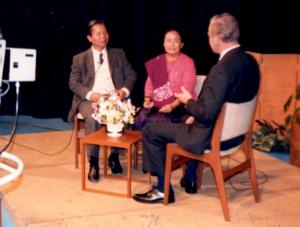Saved by minutes
 Tianethone Chantharasy has published a paper in Australia on elements that blend Buddhism and Initiatives of Change. He wrote, ‘Apart from being born in Vientiane, the capital city of Laos where the Buddhist teachings have flourished and where I learned to meditate on the life of the Buddha and on his doctrine, the Dhamma, I am privileged to know how to listen to my conscience or inner voice. (This) listening has given a new dimension in my spiritual growth, sharpening my intuition.’
Tianethone Chantharasy has published a paper in Australia on elements that blend Buddhism and Initiatives of Change. He wrote, ‘Apart from being born in Vientiane, the capital city of Laos where the Buddhist teachings have flourished and where I learned to meditate on the life of the Buddha and on his doctrine, the Dhamma, I am privileged to know how to listen to my conscience or inner voice. (This) listening has given a new dimension in my spiritual growth, sharpening my intuition.’
The struggle for freedom for him began in the 1940s, when he was enrolled as a young man in his country’s army of national liberation, struggling to oust the French colonial government. The Chantharasys could with good reason hate the French, the Japanese, the Americans, the Communists, and especially the North Vietnamese Communists, who occupied Laos, killed thousands of Laotians in concentration camps, and tried to create a new race through forced marriages between Vietnamese and Laotians. They are still passionate about freeing their country from foreign domination, but they have chosen to break what they call ‘the chain of hate’. Tianethone asks, ‘If you have hatred against your brother, how can you liberate your country?’
In an essay, ‘Prospects of National Reconciliation in Laos’, which he wrote in 1955 on behalf of leaders of the Laotian community in Australia, Chantharasy says that Laos has been cursed with a vicious cycle of hatred and revenge. In order to succeed, an attempt at national reconciliation needs a new dimension: national forgiveness. ‘The chain of hate in the hearts of leaders and educated Laotians must first be broken as part of any attempt to tackle the problems facing the nation.’
He believes that no Laotian can forget, but they can forgive; the list of dangers of nonforgiveness is long. One of them is that people remain prisoners of the past, harbouring constant collective memories of resentment and hate which are capable of triggering new armed conflict. The path of reconciliation through forgiveness among Laotian political leaders is untried and will be arduous. ‘But with strong and courageous political will and a clear vision from both sides, the chain of hatred and revenge will be broken.’
The Chantharasy’s passion to win back their country to freedom and democracy is matched by their desire to create a Laotian society in the future that would be impervious to takeover. ‘We must have the insight to see beyond the liberation of Laos,’ Tianthone tells his fellow country men and women, ‘because we have seen in many other countries that after liberation there has been a change of power but the bloodshed continues. We need to start on a new basis and build trust, confidence, love and respect for different tribes and ethnic minorities.’
In this approach they build on their commitment to Buddhism, in which, he believes, lies ‘the greatest hope’ for his country. ‘We need to neutralize the power of hatred and hold collective ceremonies of prayer and forgiveness in all Laotian pagodas around the world. Forgiveness is not a panacea to all the problems, but will open the opportunity to bring real peace and prosperity to Laos.’
The Chantharasys are alive today because of their generous approach to all and their effort to reach out even to those who disagreed with them. While Tianethone was in the coalition government he and Viengxay were working to lay moral foundations for their society. A young leftist militant observed them and was attracted by what he felt was a universal approach. One day in May 1975 he went to a cell meeting and discovered that Chantharasy as a nationalist minister in the government was on the list for arrest that night. He rushed to the Chantharasy home and persuaded them to leave. The Chantharasys packed a few belongings, got the prime minister’s permission to go, left by the back door and crossed the Mekong |River into Thailand. Fifteen minutes later, Pathet Lao soldiers arrived at their house to arrest them.
Extract from Forgiveness: Breaking the Chain of Hate.

